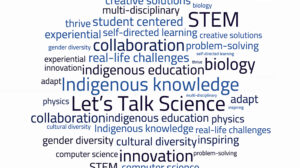Courage is a transformative force in education, defined as confidently acting in alignment with beliefs despite fear or opposition. Within educational settings, courage is foundational to resilience and growth. In this article, we explore the significance of cultivating courage among students and principals, drawing insights from various sources to illuminate its profound impact on individuals and the broader educational community.
Courage takes various forms in education, often seen in inspiring stories of resilience during challenging times. These stories underscore the pivotal role of school environments in motivating students to forge paths beyond conventional expectations and embrace courage as a driving force for change.
Students who embody courage are not only resilient but proactive in seeking opportunities for growth. They demonstrate a willingness to take risks, make mistakes, and learn from failures—a crucial aspect of the learning process. By fostering an environment where courage is celebrated and nurtured, educators empower students to navigate uncertainties with confidence.
In the classroom, fostering courage involves creating a safe space for students to express themselves authentically and take ownership of their learning journey. Educators play a vital role in instilling courage by encouraging students to step out of their comfort zones, try new things, and voice their opinions respectfully. By providing constructive feedback and guidance, teachers empower students to embrace challenges as opportunities for personal and academic growth.
4 Types of Courage
According to an article titled The 4 Types of Everyday Courage by Cathy J. Lansher. 4 categories of courage exist in our everyday lives: moral courage, disciplined courage, intellectual courage, and empathetic courage. These categories of courage are not about heroism, but about having the determination and skills necessary to make tough calls, confront our peers and colleagues, and fight for equality and inclusion.
Moral courage is the courage to stand up for what is right when a person or group of people are being treated unfairly. Moral courage is the outward expression of our personal values and beliefs.
Disciplined courage is the ability to remain focused and unwavering in light of setbacks or failures. You stay true to your vision and the impact you want to make on the world, community, or self.
Empathetic courage is the courage to put aside our own assumptions and stereotypes and listen to another’s perspective. This opens us up to feel deeply for others and to learn from their experiences.
Intellectual courage is the ability to recognize our individual limits in thinking and be open to new ideas and understandings based on new experiences and learning.
Discussions about courageous figures serve as powerful catalysts for inspiring students to emulate bravery and advocate for positive transformations within their communities. By highlighting the impact of individual agency and collective action, educators can instill a sense of responsibility and purpose in students, encouraging them to become agents of change.
Courageous leadership among principals is essential for driving positive change within schools. Principals shape the culture and ethos of the educational institution, championing innovative approaches to education, challenging outdated policies, and advocating for necessary reforms that prioritize student well-being and academic growth.
Courageous principals lead by example, demonstrating integrity, resilience, and empathy in their interactions with students, staff, and stakeholders. They foster a culture of trust and collaboration, where diverse perspectives are valued, and everyone feels empowered to contribute to the collective goals of the school community.
Courageous leadership extends beyond individual actions to encompass collective efforts in shifting school culture towards rapid improvement. By articulating core values such as trust, respect, and high expectations, principals create environments that nurture courage, collaboration, and academic excellence among all stakeholders.
While fostering courage in education presents challenges, it also offers opportunities for innovation and growth. By reimagining the role of education in society and embracing a more holistic approach to teaching and learning, educators can create environments that foster curiosity, critical thinking, and resilience.
By nurturing partnerships with parents, communities, and other educational stakeholders, schools can create a network of support that fosters collaboration and shared responsibility for student success. Through ongoing professional development and reflective practice, educators can continue to refine their pedagogical approaches and cultivate a culture of continuous improvement within their schools.
Fostering courage among both students and principals is about instilling a mindset of resilience, innovation, and empowerment that drives positive change within educational settings. By embracing courage as a guiding principle in education, individuals can navigate challenges with confidence, advocate for meaningful reforms, and contribute to a culture where growth and progress flourish. Through collaborative efforts and collective action, we can create learning environments that inspire courage, creativity, and compassion, preparing students to thrive in an ever-changing world.
REFERENCES:
Fahmalatif, F., Martono, S., & Raharjo, T. J. (2024). Educational Empowerment: Uncovering Its Impact On Teacher Performance Through Transformational Leadership, Organizational Culture, And Innovation. Migration Letters, 21(S7), 835-857.
Kilag, O. K., Tokong, C., Enriquez, B., Deiparine, J., Purisima, R., & Zamora, M. (2023). School Leaders: The Extent of Management Empowerment and Its Impact on Teacher and School Effectiveness. Excellencia: International Multi-disciplinary Journal of Education (2994-9521), 1(1), 127-140..
Lin, R., Yang, J., Jiang, F., & Li, J. (2023). Does teacher’s data literacy and digital teaching competence influence empowering students in the classroom? Evidence from China. Education and information technologies, 28(3), 2845-2867.
Mestry, R. (2017). Empowering principals to lead and manage public schools effectively in the 21st century. South African Journal of Education, 37(1), 1-11.
ABOUT THE AUTHORS:
Truman Spring, PhD is the Associate Director of the MEd in Leadership program, as well as the Director of Continuing Education for City University in Canada.
Heather Henderson, EdD is the Canadian Director of the MEd in Leadership program for City University in Canada.










